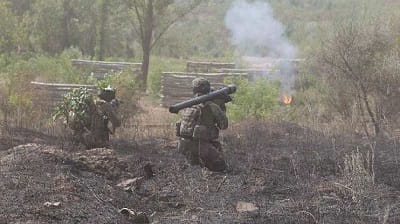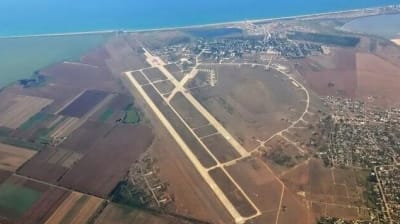Russia exports stolen Ukrainian grain to Turkey – Skhemy
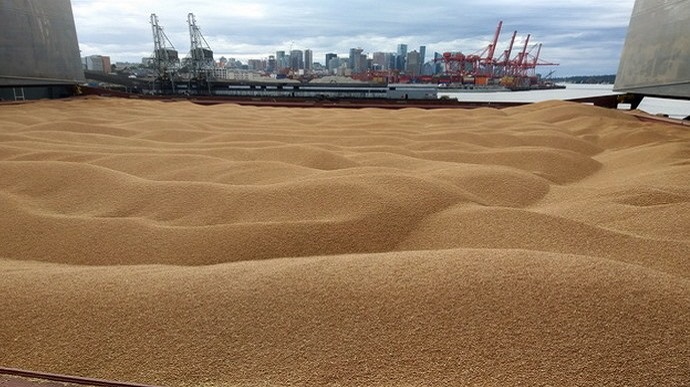
Olha Hlushchenko — Tuesday, 5 July 2022, 00:30
Despite assurances from the Turkish authorities to refrain from buying Ukrainian grain stolen by Russia from the occupied territories, investigative journalists from Skhemy [Radio Free Europe and Ukrainian joint project] provide evidence to the contrary.
Source: Skhemy (Radio Free Europe/Radio Liberty)
Details: The investigation has revealed that the Russian aggressors turn off radars on ships transporting Ukrainian grain from Crimea to Turkish ports, but this systematic process is regularly documented by satellite images.
Journalists also published photos of documents accompanying the grain, which Turkey imports in large batches: the documents indicate the place of origin for the goods as "Crimea, Russia". Grain is loaded in the port of Avlita (Sevastopol), where it is taken from the temporarily occupied territories, including from Kherson and Zaporizhzhia Oblasts.
The journalists used two vessels — one Russian and one Syrian — as an example to demonstrate how bulk carriers regularly entered the sanctioned Sevastopol port, where they were loaded with grain through the Avlita terminal, and then arrived in Turkey where they were unloaded. The bulk carriers turn off their radars when entering a Crimean port, so they cannot be tracked through vessel monitoring systems such as Marine Traffic or Equasis. However, they failed to "hide" from the satellite, which records the stay and loading of vessels in the Crimean port of Avlita from space.
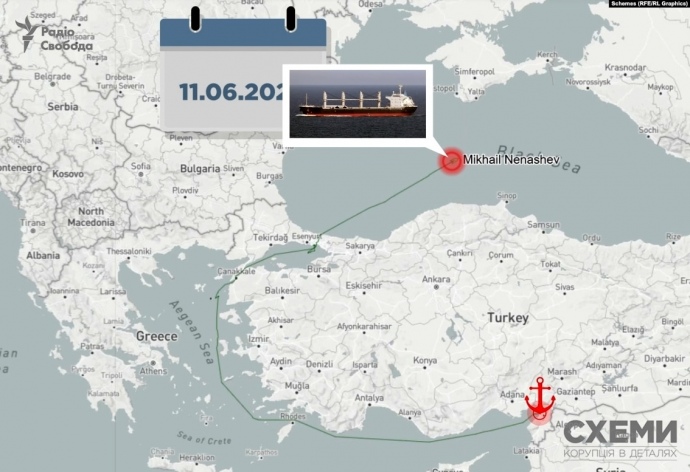
One such vessel is the Mikhail Nenashev, sailing under the Russian flag. The journalists provide evidence that it has made three sailings from a port in Crimea to ports in Turkey. On 15 April, the Planet Labs satellite recorded this bulk carrier near Avlita. The vessel remained "invisible" to the official Marine Traffic vessel monitoring system because her radars were turned off for three days.
Although, this service recorded that before entering the Crimean port the vessel was "in ballast", meaning that it was not carrying any cargo. However, the ship left the port loaded. On 22 April, the Mikhail Nenashev entered the Turkish port of Derince. The system recorded that the bulk carrier was unloaded four days later.
The Mikhail Nenashev made another voyage to Turkey in May. On 25 May, the Planet Labs satellite recorded it near Avlita. On 26 May, the bulk carrier put to sea and turned on its radars, becoming "visible" to Marine Traffic monitoring. The same service recorded the cargo on board. On 30 May, the Mikhail Nenashev reached the Turkish port of Iskenderun.
The bulk carrier repeated its journey one week later, leaving Turkey empty. The vessel entered the waters of the Black Sea and allegedly headed for the Kavkaz anchorage in the Kerch Strait, turning off its radars. However, a satellite recorded it near Avlita on 14 June. That day her cargo holds were empty, and the next day they were loaded with grain.
On 18 June, the bulk carrier Mikhail Nenashev appeared on the radar near the Kerch Strait and headed for Turkey. On 25 June, it docked at the moorings of the private port of MMK Metalurji near Iskenderun, where it was documented by journalist Osman Pashaiev.
Another bulker tracked by Skhemy is the Syrian ship Finikia. On 20 April, it appeared on satellite images in the port of Avlita.
.
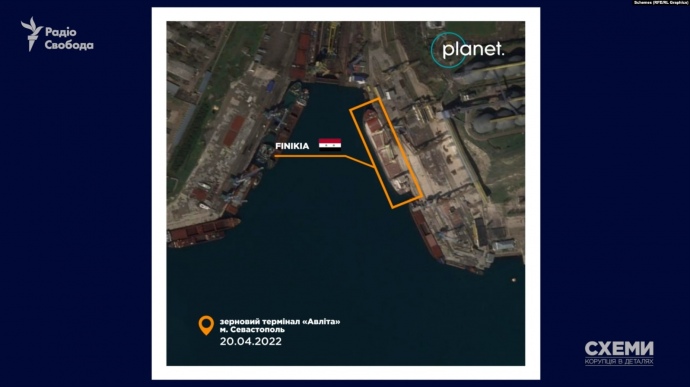
The ship only appeared on the radars again on 21 April, having already put to sea loaded. On 29 April, it docked in Nemrut in Turkey and unloaded the grain.
On 6 May, the empty Finikia left on a new voyage from Nemrut to the Black Sea. The investigation shows that the procedure was repeated: the ship turned off its radars on 10 May, but she was detected by a satellite in Avlita on 13 May. The bulk carrier was loaded with grain and arrived in Iskenderun on 24 May.
In addition to satellite images, Skhemy has documents that show that the Mikhail Nenashev and Finikia were loaded with grain on the way to Turkey at the Crimean terminal of Avlita.
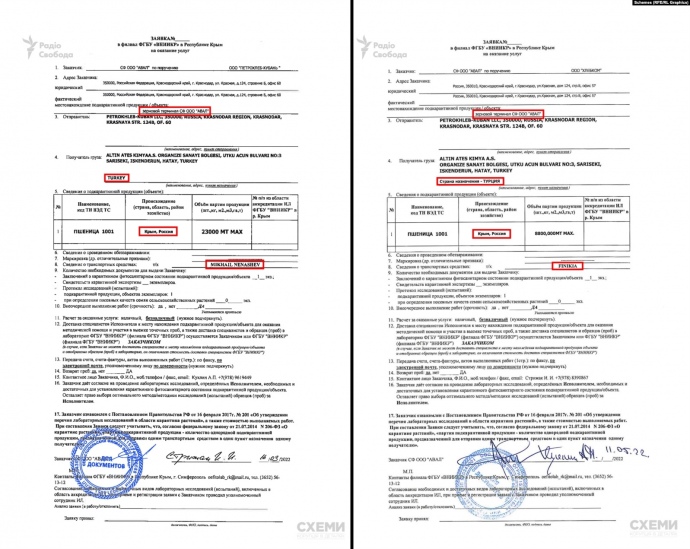
Notably, the documents indicate the origin of the grain as "Crimea, Russia". "Turkey recognised the annexation of Crimea as illegal, since when did ‘Crimea, Russia’ become a legitimate origin of goods?" the authors of the investigation ask.
Ukrainian ambassador to Turkey, Vasyl Bodnar noted in his comment to Skhemy: "We are working with the Turkish side. Though, we have been told that the Russian documents provided for the import of grain into the port are legal and they perceive them as necessary to legally unload the ship".
The Ministry of Agrarian Policy of Ukraine reported that the grain grown in Crimea is only sufficient for domestic consumption, because Ukraine did not supply the peninsula with water for irrigation. The so-called head of Crimea, Sergey Aksyonov, appointed by Russia, openly admitted that the grain is exported from Avlita precisely from the newly occupied territories.
Turkish authorities said they have been investigating claims that Ukrainian grain had been illegally exported by Russia, including to Turkish ports, but said they had not yet identified any such shipments.
"Turkey will not allow illegal trade in Ukrainian grain or any other products supplied by any country, in particular by Russia. We will not accept such goods either. In fact, monitoring is very simple. You can do it too. In order to do this, you should simply download an application costing 5-6 dollars to your gadget. It allows you to track shipping, get information about the ports cargo ships left from and about their cargo. Anyone can access such information," Turkish Foreign Minister Mevlüt Çavuşoğlu said on 23 June.
Skhemy has submitted all the facts found that indicate the illegal export of grain from the occupied territories of Ukraine by Russia to Turkey in a request to the Turkish Ministry of Foreign Affairs and is waiting for a response.
